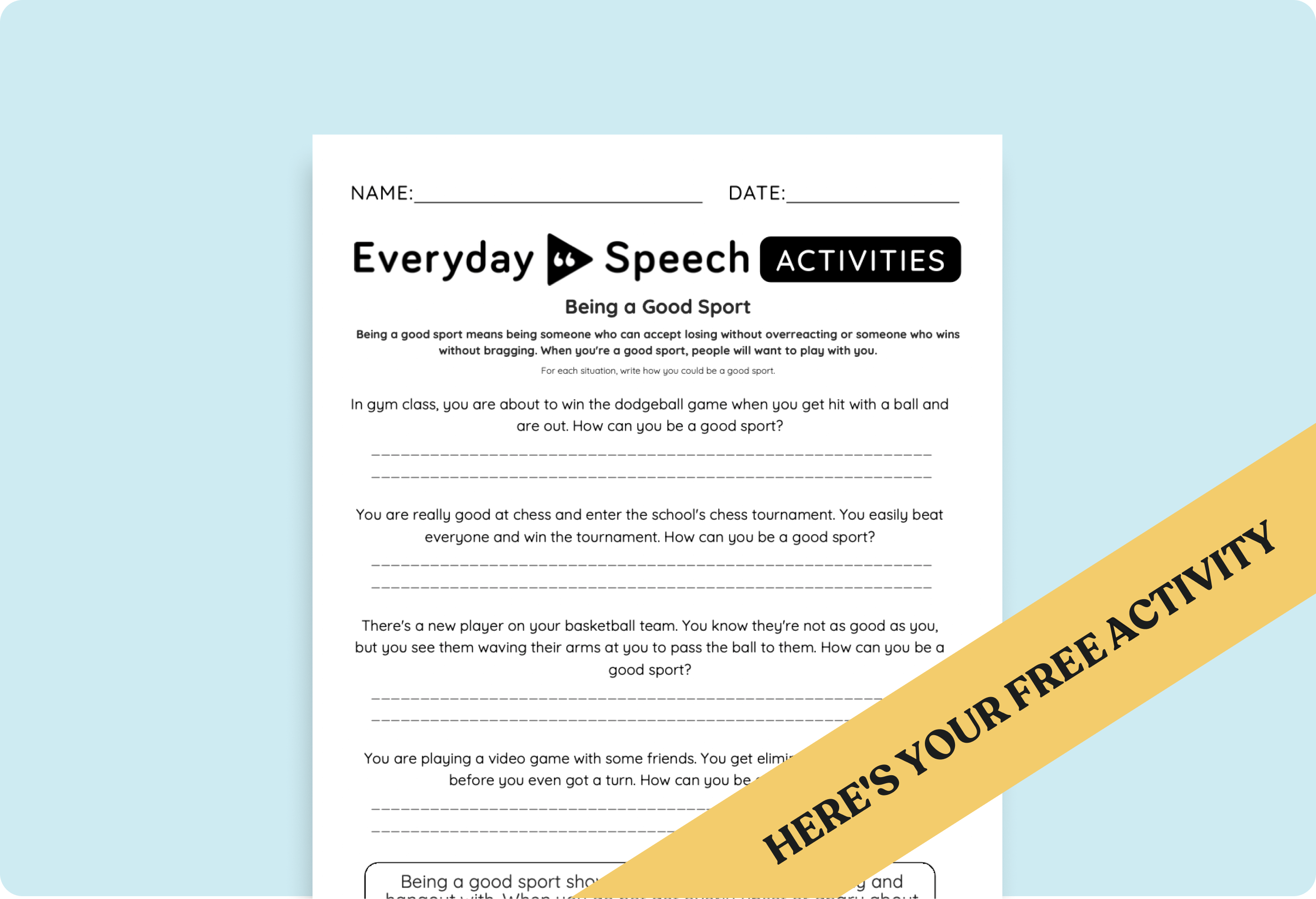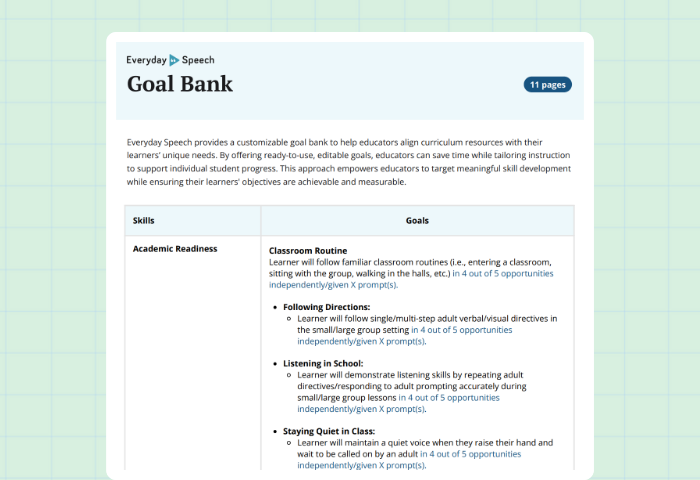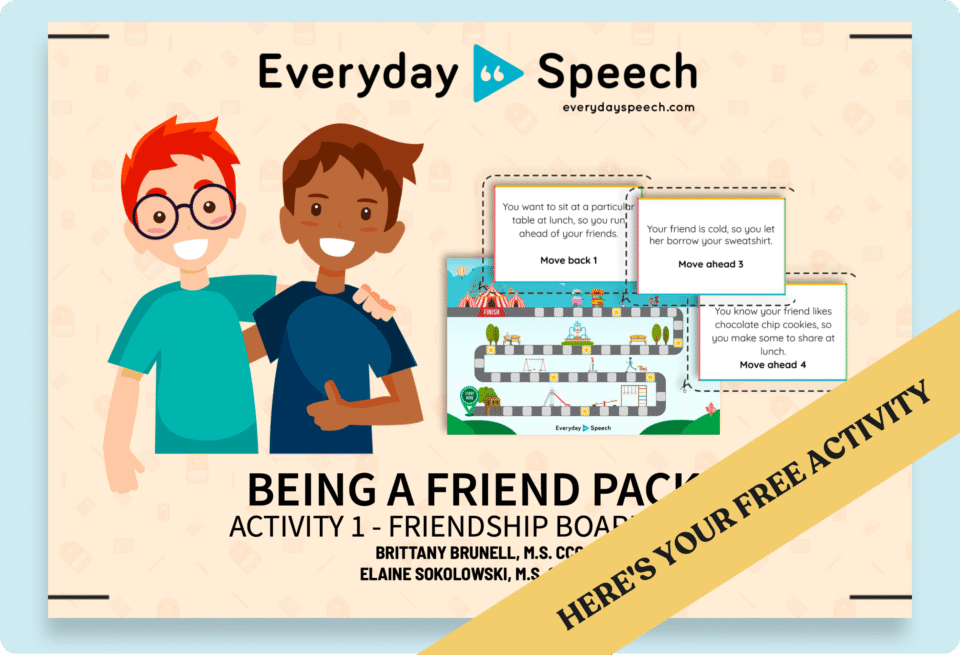High School Play Skills Worksheet: Being a Good Sport
Get free social skills materials
No-prep lessons on self-regulation, emotional recognition, conversation skills, and more.
Sign up hereFostering positive peer interactions is a central goal for those of us supporting adolescents. One important friendship skill that consistently comes up across school environments is the ability to be a good sport, especially during games, competitions, or group activities.
Related resources: See our full list of social skills lessons.
High school students encounter these situations regularly, whether in physical education classes, club meetings, after-school sports, or even informal activities at lunch. Setting students up with concrete play skills not only enhances their peer relationships, but also their confidence and willingness to participate in group contexts. Everyday Speech’s no-prep “Being a Good Sport” worksheet is a practical, student-centered tool to build these essential skills and prompt thoughtful self-reflection.
What Are Play Skills?
Get Free Activities for Friendship & Play Skills
Printable lessons, games, posters, and interactive activities that teach essential friendship skills with zero prep required
Play skills encompass a range of interpersonal abilities that support participation in group games, cooperative tasks, and friendly competition. These skills include understanding rules, taking turns, managing frustration, responding to wins and losses, and showing encouragement toward others. Play skills are truly foundational for many aspects of adolescence, particularly for developing and maintaining friendships.
Being a good sport is a specific play skill focused on responding graciously, managing reactions both during and after games, demonstrating empathy, and supporting a positive group climate. When students learn what it means to be a good sport, they become more confident participants and help shape a more inclusive environment for others.
Why Teach Play Skills?
Developing strong play skills in high school contributes to students’ social, academic, and emotional well-being. Highlights include:
- Strengthening relationships by fostering trust and respect among peers
- Promoting fairness, cooperation, and group problem-solving
- Reducing conflict and misunderstandings during group activities
- Supporting students in managing disappointment and celebrating others’ successes
- Increasing engagement and willingness to participate
- Preparing students for teamwork experiences in adulthood (work, college, social groups)
For many students, explicit instruction and guided practice are crucial for mastering these skills. Structured activities such as the “Being a Good Sport” worksheet provide opportunities for repeated exposure and reflection in a supportive, low-pressure setting.
Lesson Plan: Using Being a Good Sport
The “Being a Good Sport” worksheet is designed for high school students and can be implemented individually, in pairs, or small groups. The scenarios and prompts target real-life situations common in high school contexts, making the learning experience highly relevant and relatable.
Step 1: Introduce the Concept
Begin by discussing with students what being a good sport means. Use open-ended questions such as:
- What does it look like when someone is a good sport?
- How do you feel when you or someone else wins, loses, or makes a mistake in a game?
- Why might it be important to handle both winning and losing well?
Encourage students to draw from their own experiences. This initial conversation sets the tone for honest exploration and helps connect the skill to authentic situations. Reinforce that being a good sport is not just about games, but also about how we respond to challenges or competition in many aspects of life.
Get Free Activities for Friendship & Play Skills
Printable lessons, games, posters, and interactive activities that teach essential friendship skills with zero prep required
Step 2: Explicitly Teach Key Behaviors
Review some of the specific behaviors that demonstrate good sportsmanship. Examples include:
- Congratulating others regardless of the outcome
- Managing disappointment without blaming or criticizing
- Offering encouragement and recognizing teammates’ efforts
- Accepting both praise and constructive feedback
- Participating respectfully, following rules, and taking turns
Using concrete examples or role-play can be effective at this stage. For example, demonstrate a scenario where someone loses a game and responds by pouting or making excuses versus someone who loses and says, “Nice game, that was fun.” Discuss the impact both reactions have on the group.
Step 3: Complete the Worksheet
Distribute the “Being a Good Sport” worksheet to each student. The worksheet presents relatable scenarios that require students to reflect and generate potential responses. Examples from the worksheet include situations like losing a group trivia game, noticing a teammate making a mistake, or being frustrated during competition.
Encourage students to write full responses and think critically about each scenario. If working in pairs or small groups, consider facilitating discussion by having students share their answers and reasoning. Highlight different perspectives and reinforce that there are often multiple positive ways to show sportsmanship.
Step 4: Group Discussion and Personal Connections
After completing the worksheet, facilitate a group discussion. Guiding questions might include:
- Which scenario felt most familiar or challenging?
- Have you ever been in a similar situation? How did you or others respond?
- What could be hard about being a good sport in these situations?
- What would you want a teammate or peer to do if roles were reversed?
Encourage students to reflect on how they might apply these strategies beyond sports or games. The ability to handle feedback or disappointment gracefully is valuable in academics, work contexts, and interpersonal relationships.
Step 5: Extension Activities
Reinforce learning by incorporating brief role-plays, having students create posters about sportsmanship, or setting group norms for upcoming activities that involve competition. Revisit the skill regularly, especially before school events, tournaments, or club competitions.
Supporting Play Skills After the Activity
Generalization is a key consideration for play skills instruction, especially for students who benefit from explicit structure. Strategies to reinforce being a good sport include:
- Observing and providing gentle feedback during group activities (e.g., PE, club meetings, academic competitions)
- Using positive reinforcement when students demonstrate sportsmanlike behaviors in real time
- Supporting students in privately debriefing if group situations become tense or emotional
- Collaborating with coaches, PE teachers, or club leaders to highlight expected behaviors and recognize progress
- Encouraging self-monitoring and reflection, such as keeping a personal log of positive sportsmanship moments
For students who are developing these skills, consider providing structure in advance of high-pressure or competitive events. Practicing scripts, identifying reminders, or planning supportive peer partnerships can help. Building confidence in these skills may take time, but consistent opportunities for modeling, practice, and feedback are effective.
Wrapping Up: Empowering Teens to Build Positive Connections
High school years bring a greater range of social experiences and expectations, including more complex peer interactions and an increasing emphasis on teamwork and competition. When students develop the ability to be a good sport and practice positive play skills, the impact extends far beyond the game or activity at hand. These skills support stronger friendships, increased self-awareness, and the resilience needed to thrive both in and out of school.
Using no-prep resources like the “Being a Good Sport” worksheet means more time can be spent supporting students through authentic, meaningful conversations and practical reflection. Small-group or class discussions can normalize the challenges of competition while providing a safe place to practice and grow. With continued reinforcement throughout the school year, students can become more confident, compassionate, and connected members of their community.
Access the no-prep worksheet here: Being a Good Sport Worksheet Download.




